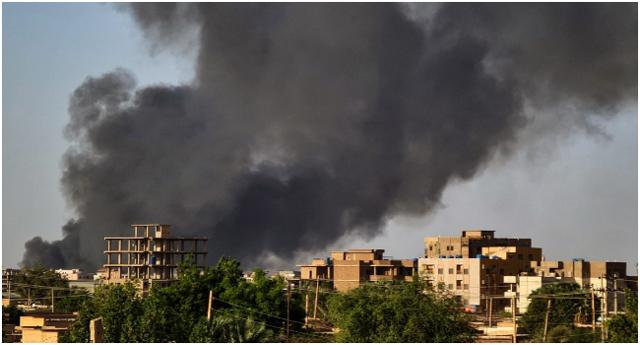
KHARTOUM, May 23 (NNN-AGENCIES) — Witnesses in the Sudanese capital reported clashes and air strikes minutes after a one-week humanitarian ceasefire took effect Monday night, with the smell of smoke still lingering after gunfire and explosions rocked Khartoum throughout the day.
The witnesses reported combat in north Khartoum, and air strikes in the east of the capital shortly after 9:45 pm when the truce was to take effect.
A series of previous truce announcements were all violated by the warring generals, but the United States and Saudi Arabia — which brokered the deal — had said this one was different because it was “signed by the parties” and will be supported by a “ceasefire monitoring mechanism”.
A witness in southern Khartoum had reported an air strike, followed by silence, shortly before the ceasefire was to take effect.
Air strikes and gun fire have usually quietened down overnight during the war which has lasted more than five weeks.
Earlier on Monday, residents of the capital — anxious for a reprieve to enable them to reach stranded relatives, flee to safety or get access to humanitarian assistance — said there was little to show fighters were preparing to pause, reporting air strikes and anti-aircraft fire for the 37th consecutive day.
Battles began on April 15 between the army, led by Sudan’s de facto leader Abdel Fattah al-Burhan, and the paramilitary Rapid Support Forces commanded by Burhan’s former deputy Mohamed Hamdan Daglo.
According to the seven-page agreement released by the US, warring sides were to use the two days before it took effect Monday night to “inform their respective forces” about it and “instruct them to comply.”
But Volker Perthes, the UN’s envoy to Sudan, told the United Nations Security Council, that “fighting and troop movements have continued even today, despite a commitment by both sides not to pursue military advantage before the ceasefire takes effect”.
While government forces control the skies they have few men on the ground in the centre of Khartoum, where RSF are on the streets.
Around 1,000 people have been killed in five weeks of violence that have plunged the already poverty-stricken country deeper into humanitarian crisis.
More than one million have been uprooted, including in excess of 250,000 who have fled across Sudan’s borders, fuelling concerns for regional stability.
Hours before the truce was to start, Daglo released a voice message on social media addressing reported violations by his forces — including rampant looting, targeting civilians and attacks on churches — all of which he blamed on “coup plotters” in the army.
To his fighters, he said “it is either victory or martyrdom, and victory will be ours”.
At the Security Council, Sudan’s representative, loyal to Burhan, blamed the RSF for similar violations.
The UN has reported hundreds of civilians killed in the West Darfur capital El Geneina, and in his Security Council address Perthes warned “the growing ethnicisation of the conflict risks to expand and prolong it with implications for the region.”
Intense fighting in Nyala, the capital of South Darfur, killed 28 people last week, according to the doctors’ union. –NNN-AGENCIES
